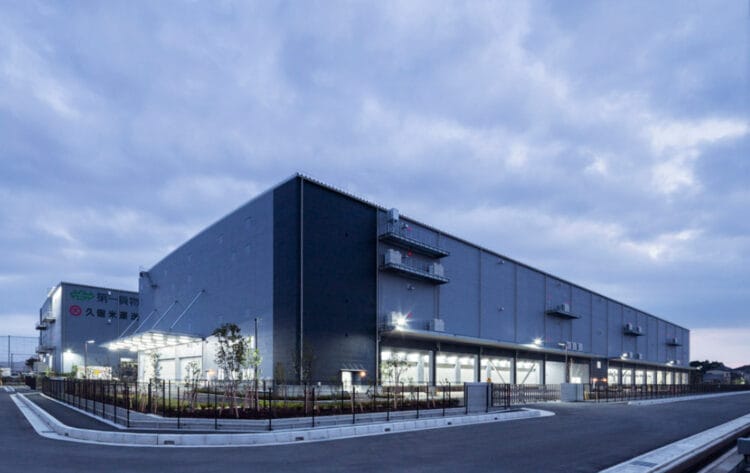
UI Iwatsuki Logistics Center in Saitama, Japan
Two years after investing in logistics developer Unified Industrial through one of its managed funds, Macquarie Asset Management is working with its partners to ramp up the Asia Pacific logistics platform, and Japan is currently central to that push.
Macquarie Asset Management’s Japan initiatives align with growing attention to the market across the industry with trades of investment properties in the country reaching their highest level in a decade during the quarter, according to MSCI. Its leadership in the region is expecting that trend to produce solid returns for real estate investors in asset classes like logistics.
“Globally, many real estate investors are still underweight on Asia Pacific, and we believe Japan currently stands out as the investable market in the region,” James Kemp, Head of Real Estate, Asia Pacific at Macquarie Asset Management told Mingtiandi. With its fund currently rolling out new logistics projects in Japan in partnership with Unified Industrial, Kemp added that, “With the amount of tenant interest and pre-commitments on our current developments, we are comfortable that there is continued demand for modern logistics space in the Japan market.”
Having invested in a number of Asia Pacific logistics platforms over the last 15 years, including being the largest shareholder and early backer of regional player LOGOS Group (now part of ESR Group), Kemp and Macquarie Asset Management are now building out their next platform, Unified Industrial, across the region, with Japan as an attractive first market.
Knowing the Market
Since Macquarie Asset Management partnered with Unified Industrial in November 2021, the company founded by principals Joshua Olsan and Ross Antoci has tripled its assets under management and taken its next steps as an institutional fund manager while expanding the on-the-ground teams necessary for site sourcing and development delivery.

James Kemp, Head of Real Estate, Asia Pacific, Macquarie Asset Management
“Japan is Unified Industrial’s backyard – they have completed US$5 billion in transactions, almost entirely off-market,” Kemp said. “Japan is a market where a lot of people are now trying their hand and Unified Industrial has demonstrated an ability to access land at the right price, even in the current environment. That and their development delivery capability are their key
points of difference.”
Earlier this year Unified Industrial announced that since forming the strategic partnership with Macquarie Asset Management, it has set up three new ventures – two in Japan and another in China. The company closed most recently on its Japan Logistics Club II venture, which was seeded with a 24,468 sqm value-add project at a prime infill location in central Tokyo.
Unified Industrial’s first two ventures – one each in Japan and China – have both now been fully deployed across five assets which will deliver more than 430,000 square metres of modern
logistics space.
With its existing ventures either fully deployed or fully identified, Unified Industrial is looking to further capitalise on its identified pipeline of over 2 million square metres of developable gross floor area, the company has said.
“Differentiating the returns starts with access to land – then it’s important to make sure the leasing teams are involved early in the underwrite,” Kemp said. “You need to have the ability to test assumptions and you need intimate knowledge of tenant requirements.”
Macro to Micro
After successful investments in LOGOS, J-REP (now part of Goodman Group) and Charter Hall, as they all grew their logistics platforms, Macquarie Asset Management has honed a model of investing in an operating company, institutionalising and growing that business whilst also investing in the real estate sourced by the operating company. All investment decisions start with the real estate, and Macquarie Asset Management sees the Japan opportunity as driven by strong market fundamentals.

David Roberts, Head of Real Estate Strategy, Macquarie Asset Management
“A number of factors including Japanese companies increasingly reshoring their manufacturing, rising e-commerce penetration, and the ‘2024 problem’1 have combined to create more demand
in a market that has long experienced structural undersupply of modern logistics facilities,” said David Roberts, Head of Real Estate Strategy at Macquarie Asset Management.
As they expand in Japan the team says they are targeting both brownfield and greenfield projects as they leverage the local presence of Unified Industrial.
As some of the world’s largest property investors turn their attention to the economy, Kemp emphasised that having local experience is critical to sourcing and implementing projects. “You need to know the submarkets,” Kemp said. “If you know the market and can access land outside of a widely marketed and competitive processes then you can still make opportunistic returns across the major logistics markets – including Greater Tokyo.”
Forming True Partnerships
In addition to its Asia Pacific logistics platforms, Macquarie Asset Management has expanded its logistics presence into the US and UK through similar platform investments and this May further expanded its warehouse bets into Mexico by acquiring a portfolio of eight fully-leased logistics properties on behalf of an institutional client, to mark its biggest Latin American real estate investment to date.
Macquarie Asset Management attributes some of the rapid growth of the logistics platforms it invests in to the relationships that it helps the platforms build with its capital partners.
“Generally, real estate investors are looking to limit the number of managers that they work with,” Kemp said. “Having launched, grown and exited logistics platforms globally, we have found receiving repeat commitments from investors across our platforms is both a sign of success and testament to investors valuing the same real estate capabilities that we look for in identifying the right operating platforms to invest in.”
1 Changing regulations relating to truck driver working hours and working environments is set to add to logistics demand in key locations, competing with third party logistics tenants for space.
Leave a Reply